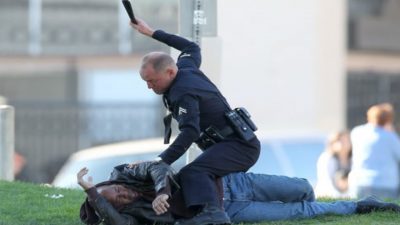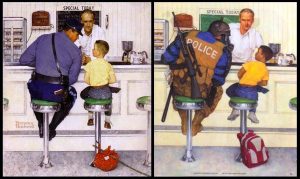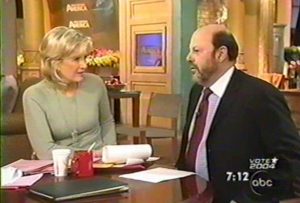![Mr. Steering interviewed about Jovan Jimenez case]() SUING POLICE OFFICERS FOR VIOLATING YOUR CONSTITUTIONAL RIGHTS
SUING POLICE OFFICERS FOR VIOLATING YOUR CONSTITUTIONAL RIGHTS
THE KEYS TO THE FEDERAL COURTHOUSE IS SOMETHING CALLED “FEDERAL QUESTION JURISDICTION“.
“Federal question jurisdiction” entitles a person whose federal constitutional rights were violated by persons acting “under the color of state law”, to sue under federal law, including in federal court itself, for redress. A typical situation involves a peace officer (i.e. deputy sheriff, police officer) violating the federal Constitutional rights of a civilian by using unreasonable force upon them and/or by falsely arresting them, and thereafter procuring their malicious criminal prosecution; today’s norm.)
| Police Misconduct Specialties: | ||
|
|
|
The federal court venue was traditionally very important to the enforcement of the Fourteenth Amendment, because black persons of African descent couldn’t get a fair trial in Southern state Superior Courts following the Civil War (that ended in late April of 1865.) Although starting-out as a Post-Civil War Southern “social organization”, the “Ku Klux Klan” soon became the local Southern “Sheriff and his deputized posse”, who terrorized and murdered black persons of African descent while acting “under the color of state law”; under the authority of the Sheriff.
Imagine a “black widow” (not the spider type) suing the local Sheriff and his posse members for murdering her husband in a Post-Civil War Southern state Superior Court, where the judge and the jury members were either part of the murdering mob, or relatives and friends of those who were. Unless black persons had a remedy in a United States District Court, as a practical matter they had no remedy at all.
The 14th Amendment grants citizenship to “all persons born or naturalized in the United States”, including and especially former slaves who had been “freed” with the ratification of the 13th Amendment (abolishing slavery) by the states on December 6, 1865.
The 14th Amendment had been rejected by most Southern states, but was ratified by the required three-fourths of the states on July 28, 1868. Known as the “Reconstruction Amendment,” it makes any former slaves who were born in the United States, citizens, and forbids any state to deny any person (especially former slaves) “life, liberty or property, without due process of law” or to “deny to any person within its jurisdiction the equal protection of the laws.”
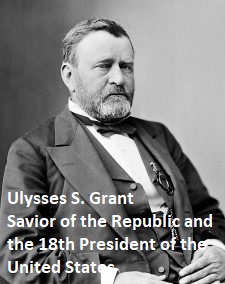 Thereafter, in response to a letter to Congress from President Ulysses S. Grant complaining of the conditions in the Southern states, on April 20, 1871 Congress enacted the the statute that we sue police officers under to this very day; The Ku Klux Klan Act of 1871; 42 U.S.C.§ 1983. Also known as the “Third Enforcement Act”, Congress enacted Section 1983 to enforce the 14th Amendment; at that time to provide black persons of African descent with a civil remedy for damages in federal court against “the Sheriff” and his posse, who were ”acting under the color of state law” when they violated their victims’ federal constitutional rights (i.e. murdering black people in the South and otherwise terrorizing them. This is the very same law that we sue police officers under to this very day.
Thereafter, in response to a letter to Congress from President Ulysses S. Grant complaining of the conditions in the Southern states, on April 20, 1871 Congress enacted the the statute that we sue police officers under to this very day; The Ku Klux Klan Act of 1871; 42 U.S.C.§ 1983. Also known as the “Third Enforcement Act”, Congress enacted Section 1983 to enforce the 14th Amendment; at that time to provide black persons of African descent with a civil remedy for damages in federal court against “the Sheriff” and his posse, who were ”acting under the color of state law” when they violated their victims’ federal constitutional rights (i.e. murdering black people in the South and otherwise terrorizing them. This is the very same law that we sue police officers under to this very day.
The Third Enforcement Act, also known as The Ku Klux Klan Act of 1871 and 42 U.S.C. § 1983 provides:
“Every person who, under color of any statute, ordinance, regulation, custom, or usage, of any State or Territory or the District of Columbia, subjects, or causes to be subjected, any citizen of the United States or other person within the jurisdiction thereof to the deprivation of any rights, privileges, or immunities secured by the Constitution and laws, shall be liable to the party injured in an action at law, suit in equity, or other proper proceeding for redress, except that in any action brought against a judicial officer for an act or omission taken in such officer’s judicial capacity, injunctive relief shall not be granted unless a declaratory decree was violated or declaratory relief was unavailable.”
Although the original immediate class of persons that the 14th Amendment was ratified to protect were black persons of African descent, those protections of the 14th Amendment apply to all persons.
THE RESURRECTION OF SECTION 1983.
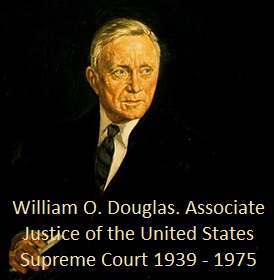 In 1961 in Monroe v. Pape, 365 U.S. 167 (1961) the Supreme Court finally held that the The Ku Klux Klan Act of 1871, now 42 U.S.C. § 1983, is obligatory on the states, and that a person whose federal constitutional rights were violated by someone acting under the color of state law can sue for damages under that statute.
In 1961 in Monroe v. Pape, 365 U.S. 167 (1961) the Supreme Court finally held that the The Ku Klux Klan Act of 1871, now 42 U.S.C. § 1983, is obligatory on the states, and that a person whose federal constitutional rights were violated by someone acting under the color of state law can sue for damages under that statute.
In order to give person’s whose constitutional rights a real opportunity to obtain redress for violation of those rights, in 1976 Congress enacted 42 U.S.C. § 1988, to provides that a trial court may award a prevailing civil rights plaintiff attorney’s fees as costs. This was necessary to vindicate smaller but not less important constitutional violations by public officers and officials. Without the award of attorney’s fees most civil rights cases would not be brought. Lawyers are not going to litigate these cases for free, and they are not going to put hundreds of thousands of dollars of attorney’s hours into a case with no chance for any real pay out to them. It is just not going to happen.
TWO BITES AT THE APPLE; YOUNGER ABSTENTION DOCTRINE.
In Younger v. Harris, 401 U.S. 37 (1971) the Supreme Court held that federal courts may only enjoin state court criminal proceedings under very limited circumstances. Moreover, Younger has been abused and expanded to the point where is the police beat you, falsely arrest you and procure your bogus criminal prosecution, that if you try to sue them that the federal courts will generally “abstain” from proceeded with the federal lawsuit is there is an issue of federal constitutional law that should be decided in the state court criminal proceeding. See, Abstention—Discretion to Decline Jurisdiction, Federal Practice Manuel for Legal Aid Attorneys, Shriver Center for Law and Poverty. See also, Doctrine of Younger v. Harris: Deference in Search of a Rationale, Cornell Law Review, Volume 63, Issue 3, March 1978.
IF YOU’RE THE VICTIM; YOU’RE THE ENEMY; SUING THE POLICE WHEN YOU HAVE BEEN CRIMINALLY PROSECUTED FOR THE SAME INCIDENT IN WHICH YOUR CONSTITUTIONAL RIGHTS HAVE BEEN VIOLATED.
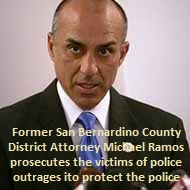 The system, and the “players” and “politicians” in that system, now recognize you as their enemy. As a matter of political and institutional reality, you, the victim of constitutional violations by peace officers acting under the color of authority, are someone who poses a real threat to them. After all, the cops put you in the hospital, and you’re now being prosecuted for resisting or delaying or obstructing them handcuffing you while you were trying to cover your face from the blows (Cal. Penal Code § 148(a)(1); resisting / obstructing / delaying peace officer; the most vague, nebulous and the most misused and abused section in the California Penal Code.)
The system, and the “players” and “politicians” in that system, now recognize you as their enemy. As a matter of political and institutional reality, you, the victim of constitutional violations by peace officers acting under the color of authority, are someone who poses a real threat to them. After all, the cops put you in the hospital, and you’re now being prosecuted for resisting or delaying or obstructing them handcuffing you while you were trying to cover your face from the blows (Cal. Penal Code § 148(a)(1); resisting / obstructing / delaying peace officer; the most vague, nebulous and the most misused and abused section in the California Penal Code.)
If they beat you up too badly, the D.A. will throw in a Count of battery on a peace officer (Penal Code Section 243(b)) or felony preventing public officer from performing duty by use or threat of force (Penal Code Section 69). In the real world, 99% of the time, battery on a peace officer is really battery by a peace officer. If this offends your personal belief system, I’m sorry to pop your cherry. This is the modern world of Fourth Amendment jurisprudence (i.e. the right of the police to search and seize you and you home and property). The law isn’t what’s in a book or on the internet. The law is what happens to real people in the real world. The law isn’t what it says; only what it does.
Yesterday you believed that police officers were basically honest, with a few deviants here and there. Yesterday, you didn’t feel threatened if a police officer was driving behind you, because you believed that since you don’t break the law (and or since you look like white and respectable type), that the police are not going to do anything bad to you. Yesterday is now gone. You still can’t believe that this really happened to you. You really didn’t do anything wrong, but you’ve been beaten-up and falsely arrested, and to boot, you are now being accused of a crime by the District Attorney’s Office; really to beat you down to protect the police from liability. That’s reality. Today is a new day in your life. You would not have believed what really happened to you if it had happened to another. That all being said, since the police beat you up, you either deserved it or you didn’t. So, how are the politicians going to handle your situation?
Just imagine a Chief of Police or a County Sheriff announcing at a Press Conference, that his agency took the word of independent civilian witnesses over that of a group of police officers and is firing the officer or deputy for either using unreasonable force upon or falsely arresting a civilian. What would the politicians say? We know that that will never happen.
Although we elect politicians and insist on them being totally honest with the public, we actually expect them to act in a dishonest and disingenuous way with the public. We expect the City Attorney to guard the City coffers, by denying that the police unlawfully committed a duty related activity (i.e. using force on an innocent arrestee, or simply falsely arresting an innocent), even if they know otherwise; even if the evidence is so overwhelming and moving that no reasonable person would deny (with a straight face) that the police acted wrongfully. So, on the civil side, the City or County is going to claim that you’re to blame; that it’s your fault.
Then, the D.A.’s office jumps in the fray, and attempts to get you to plead to any crime; a plea that will almost assuredly preclude you from obtaining redress for the wrongs perpetrated upon you. After all, the U.S. Supreme Court had upheld release – dismissal agreements; an agreement where the D.A.’s offices promises to drop the bogus criminal case against you and let you out of jail, in exchange for a promise not to sue. Newton v. Rumery, 480 U.S. 386 (1987.) Creepy, huh? Extortion? Sounds like it. MacDonald v. Musick, 425 F. 2d 373 (9th Cir. 1970) (conditioning dismissal of criminal DUI charge in exchange of promise not to sue police is felonious extortion under California law.) But so long the government is the extorting party, no crime, since no one is going to prosecute a Deputy District Attorney for making such a dismissal offer.
Even when it’s obvious that a public entity is going to have to most likely pay money to a victim of their officer, the agency will never admit fault. So, since they didn’t do anything wrong, you must have. Therefore, you’re the enemy, because you’re a potential threat to them; to their paycheck; to them being imprisoned (however remote that really is); to them being promoted in the future; to them being disciplined (i.e. reprimanded, suspended, demoted or terminated) and to them being exposed to obloquy and disgrace.
Most of our law firm’s Police Misconduct clients, were factually and actually innocent of anything; yet most of them where at the wrong spot at the wrong time, or had the audacity to question police authority.
When many of our clients questioned or challenged police orders to them, the officers routinely have claimed that they have now “resisted” them or have “delayed” the officer’s investigation of them, or of another (real or imaginary; the most common claim by officers in bogus “Contempt of Cop” cases), by asking the officer for further identification, or by asking why there was a red laser targeting spot on their chest, or by asking why the officer wanted them to get prone-out on the ground when they had no clue why the police were even engaging them at all. These actions by our clients, true innocents, have typically resulted in them getting “gooned” by the cops, and half of them getting criminally prosecuted for non-existent crimes, to protect the officers and the agency from civil liability and disgrace. In all of these situations, the cops were going to show our client’s who’s in charge, and it’s not the client. These are truly ego crimes; “Contempt of Cop” crimes.
SUING THE POLICE WHEN YOU HAVE BEEN CRIMINALLY PROSECUTED FOR THE SAME INCIDENT IN WHICH YOUR CONSTITUTIONAL RIGHTS HAVE BEEN VIOLATED.
In Younger v. Harris, 401 U.S. 37 (1971), a federal plaintiff attempted to enjoin a state criminal prosecution on the ground that the prosecution was unconstitutional. Based on the limits of federal courts’ equity jurisdiction and on the more “vital consideration” of comity between state and federal courts, the Supreme Court reversed the District Court’s injunction of the state criminal proceeding. Id. at 43-44. Subsequently, the Supreme Court held that Younger abstention applied also to federal claims requesting declaratory relief that a state statute, under which plaintiffs were being prosecuted, was unconstitutional. Samuels v. Mackell, 401 U.S. 66, 72 (1971). Later, the Supreme Court further explicated the comity principles on which Younger abstention is grounded: “that the state’s interest in administration of its judicial system is important, that federal court interference
WHY THE COPS TRY TO DESTROY YOU; TO PROTECT THEMSELVES.
The Police know that once they’ve crossed-over a clear and well-defined Constitutional boundary, such as your Constitutional right to be free from a sadistic police beating (U.S. Const. Amends. 4 and 14), that they must immediately take steps to shift the blame for their use of force upon you; for it certainly can’t fall upon them, lest they be considered monsters; “Bad Apples”. Their first step being to either immediately arrest you, or to restrain or confine your freedom to leave their presence. This is done as a matter of reflex, rather than a product of reflection, by police authorities. You’re not going anywhere until the police figure-out what to do with you. Hospital, Jail, or otherwise. It’s automatic for you to be taken to jail, even if you’re taken for a humiliating visit to the hospital (bloody and in handcuffs, being escorted by the police), on the way there. It doesn’t matter that you committed no crime. All that does matter at that time, is that they did (i.e. they beat you up; federal and state crimes), and they don’t plan on taking the blame for doing so. They justify their behavior, by accusing you of de minimis and vague criminal offenses; especially of California Penal Code Section 148(a)(1) (Resisting / Obstructing / Delaying a Peace Officer.)
If your sadistic police beating was bad enough to be actually kept in the hospital, or if it’s obvious to the Patrol Sergeant that the patient didn’t deserve what he got (and assuming that your Patrol Sergeant isn’t the truly creepy kind, you may be given a Citation to appear in Court, or you might even get “long formed”. Getting “long formed” is police lingo (in the real world), for not formally arresting you now, but nonetheless concocting a phony story about the event that resulted in you being in the hospital, and based upon the template of the bogus story, create phony reports to support that story, and conceal and destroy evidence that belies the concocted story, such a deleting an audio or video recording of the actual incident complained of, or a materially significant portion of any such recording. Usually, the officers create not all that serious allegations of criminality by you; not enough for you to realistically be exposed to any jail time, but serious enough to justify their conduct, and, most importantly, serious enough to get you criminally prosecuted.
The police really do create false and misleading police reports to shore-up the odds, that some young and ambitious Deputy District Attorney, will want to endear himself to a police agency, by protecting them from civil liability. The young and ambitious Deputy District Attorney files a criminal case against you for violation of California Penal Code Sections 148(a)(1) (Resisting / Obstructing / Delaying a Peace Officer), and Sections 240/241(c) and 242/243(b); Assault and Battery on a Peace Officer. Now what do you do? If you take a plea bargain, you can’t sue for the damages that you suffered from being falsely arrest and falsely prosecuted for a crime, and the mental and financial toll that being falsely arrested and falsely prosecuted takes on one (i.e. job loss, attorney’s fees.)
If, rather than take a plea bargain, and you stand your ground and defend yourself in court, you can pay many thousands of dollars for a lawyer, to defend you on a bogus criminal charge, that is usually a misdemeanor, and usually will result in no jail time, and a de minimis fine. What do you do? Do you spend the money on a lawyer and hope that things work about and that after you prevail on your criminal case, that you can sue and get pay-back and paid back? Mr. Steering has been contemporaneously defending these bogus Police Misconduct criminal actions, and prosecuting civil rights lawsuits for victims of police outrages, since 1984. He will know what to do in your particular case.
SUING THE POLICE FOR CONSTITUTIONAL VIOLATIONS AND OTHER TORTIOUS CONDUCT, WHEN NO CRIMINAL CASE HAS BEEN FILED AGAINST THE POLICE MISCONDUCT VICTIM.
In many cases, notwithstanding efforts by local police agencies to procure the filing of a bogus criminal case against the victim of their oppression, Deputy DA’s see the same reports from the same cops, that again and again and again, seek the criminal prosecution of persons for “resisting / obstructing / delaying a peace office in the lawful performance of his/her duties”, when the “suspect” always ends-up in the hospital. Therefore, many times, we can proceed to sue the officers in the appropriate court (usually federal court), without having to wait for the conclusion of underlying bogus criminal proceedings, since they will not be any.
If you want to know what do to if you’ve been falsely arrested, retaliated against for exercise of your constitutional rights, beaten-up by the police or maliciously prosecuted, please contact us at (949) 474-1849 or jerrysteering@yahoo.com. Thank you for visiting with us, and best of luck. Even if you have a legal question that’s important to you, and you just need lawyer input, we’ll be glad to answer your questions.
Thank you again for visiting with us.
Jerry L. Steering, Esq.
What to Do If You Have Been Falsely Arrested or Beaten-up by the Police – Click Here
Jerry L. Steering with Diane Sawyer, Co-counsel* Bob Dole,
and former partner** Melvin M. Belli
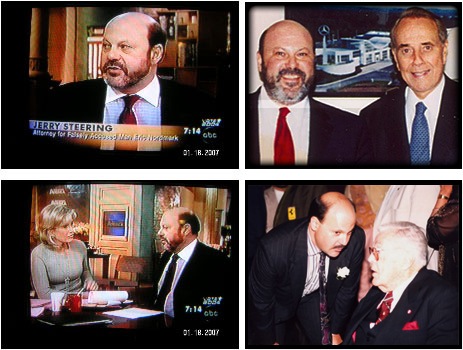 Suing Bad Cops
Suing Bad Cops
Defending Bogus Criminal
Cases Since 1984
***The State Bar of California does not recognize a specialty in police misconduct
which is most of Mr. Steering’s law practice.
*In the District of Columbia only.
**In Beverly Hills Office only.

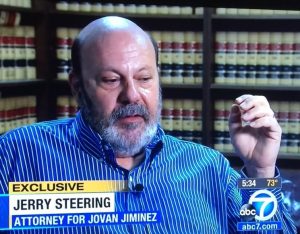 SUING POLICE OFFICERS FOR VIOLATING YOUR CONSTITUTIONAL RIGHTS
SUING POLICE OFFICERS FOR VIOLATING YOUR CONSTITUTIONAL RIGHTS

